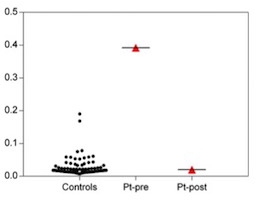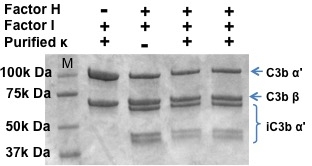C3 Glomerulopathy Secondary to Complement Factor H Inhibition by Monoclonal Kappa Light Chains.
1Medicine, University of Washington, Seattle, WA
2Medicine & Surgery, University of Iowa, Iowa City, IA
3Medicine, Seattle Cancer Care Alliance, Seattle, WA.
Meeting: 2016 American Transplant Congress
Abstract number: B304
Keywords: Glomerulonephritis, Malignancy, Monoclonal antibodies, Recurrence
Session Information
Session Name: Poster Session B: PTLD/Malignancies: All Topics
Session Type: Poster Session
Date: Sunday, June 12, 2016
Session Time: 6:00pm-7:00pm
 Presentation Time: 6:00pm-7:00pm
Presentation Time: 6:00pm-7:00pm
Location: Halls C&D
Background: Monoclonal gammopathy of renal significance (MGRS) implies a causal relationship between clonal B cell proliferation and renal disease and is associated with high morbidity due to circulating monoclonal immunoglobulins (MIg). A subset of MGRS with dominant glomerular C3 deposition or MGRS-C3 glomerulopathy (C3G) has been reported. Free immunoglobulin light chains (FLCs) are detected in some patients with complement-mediated kidney disease. Here we report the first case of monoclonal IgG κ FLC binding and inhibiting Factor H (FH) regulatory activity leading to C3G.
Case: A 68yr old man with ESRD from MPGN and a history of MGUS (Monoclonal IgG κ 1g/dL in 2010) was evaluated for kidney transplant in 2014. He had low C3 34mg/dl (87-247), normal C4 & C5. Functional complement assays revealed elevated soluble C5b-9 and high FH autoantibody titer (1:400). IgG κ FLCs bind and inhibit FH by ELISA  and Cofactor Assay.
and Cofactor Assay.  He received 5 cycles of cyclophosphamide, bortezomib and dexamethasone (CyBorD), normalizing FLCs, complement levels and functional assays.
He received 5 cycles of cyclophosphamide, bortezomib and dexamethasone (CyBorD), normalizing FLCs, complement levels and functional assays.
Discussion: The MGRS-IgG κ FLCs can act as mini-autoantibodies against the N-terminus of FH, impairing cofactor activity. The patient experienced a complete response. Repeat labs and kidney transplant candidacy will be assessed after 3 more cycles of chemotherapy.
Conclusion: Detailed analysis of patients' health prior to transplant can mitigate potential risks, including recurrent C3G. IgG κ FLC causing dysregulation of alternative complement pathway through FH inhibition has not been previously reported. Treatment with appropriate chemotherapy and/or autologous stem cell transplant should be considered for such patients.
CITATION INFORMATION: Blosser C, Zhang Y, Dhawale T, Johnson C, Hendrie P, Smith R. C3 Glomerulopathy Secondary to Complement Factor H Inhibition by Monoclonal Kappa Light Chains. Am J Transplant. 2016;16 (suppl 3).
To cite this abstract in AMA style:
Blosser C, Zhang Y, Dhawale T, Johnson C, Hendrie P, Smith R. C3 Glomerulopathy Secondary to Complement Factor H Inhibition by Monoclonal Kappa Light Chains. [abstract]. Am J Transplant. 2016; 16 (suppl 3). https://atcmeetingabstracts.com/abstract/c3-glomerulopathy-secondary-to-complement-factor-h-inhibition-by-monoclonal-kappa-light-chains/. Accessed July 5, 2025.« Back to 2016 American Transplant Congress
